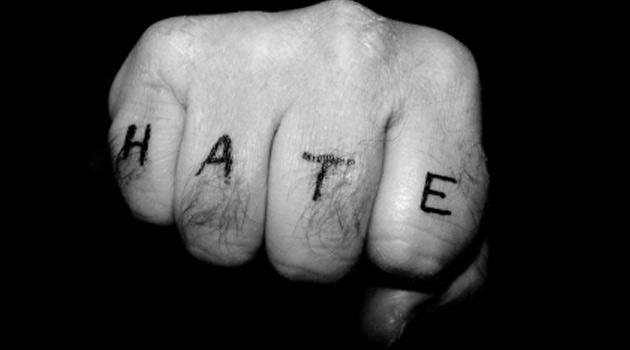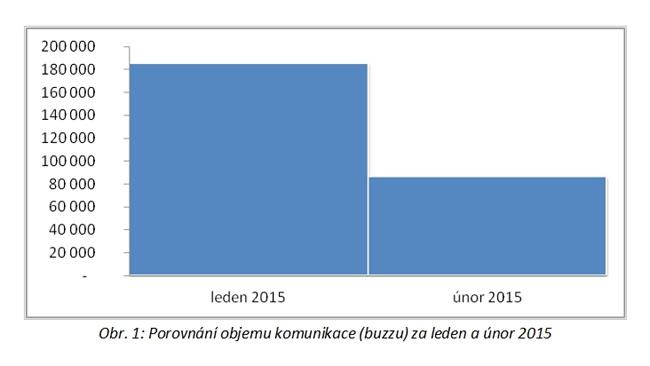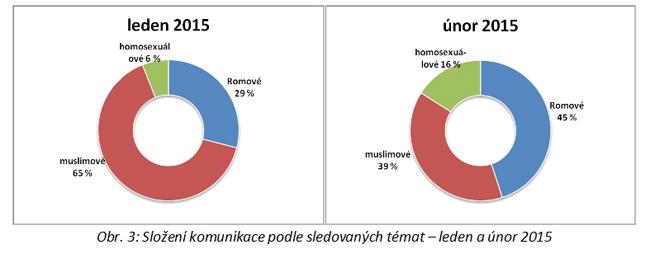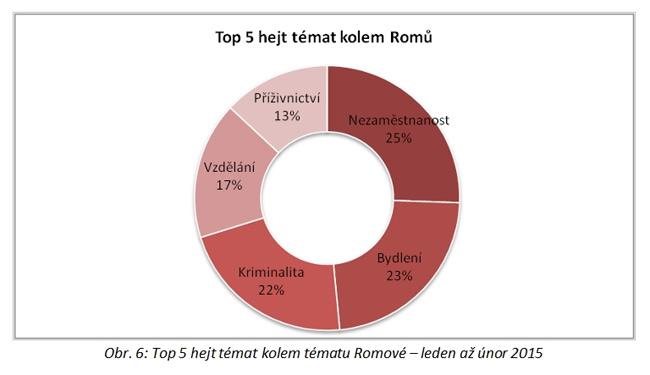Analysis: Roma replace Muslims as main target for Czech hate online

Hatred on the Czech-language Internet has returned to its traditional target, Romani people, as a result of the declining outrage over January’s attacks in Paris, when Muslims became the main target of Czech-language online hate. Current data from the Yeseter company measuring the intensity of hatred and its trends for the HateFree Culture initiative reveal several interesting facts, including the fact that most "haters" don’t focus on a single theme, but can flow freely from "hating" one group to another.
On the other hand, there does exist a rather fixed number of basic procedures these haters combine among themselves and repeat. The analysis also provides a profile of the standard Czech-language Internet hater.
Volume of communications shrinks, Roma back as number one target
Even though during February the overall volume of posts about minorities fell compared to January, such themes were still popular. For comparison’s sake, in December 2014 such communications were one-third the volume of such communications in February 2015. "It is evident that these themes are still being discussed rather intensively on the domestic Internet," the authors of the analysis say.

Internet posts after the exceptionally highly-publicized events in Paris at the beginning of January have almost returned to normal in the domestic web environment, as is demonstrated by a return to the familiar Romani themes that were drowned out in January by themes about the Muslim world.
"The exacerbated atmosphere after the attacks in Paris has calmed somewhat now and posts about Romani people have regained their top place since February," the Yeseter company writes in a press release. A month-to-month comparison of the themes followed shows that the volume of communications about Muslims has significantly shrunk, as has the volume of communications about Roma.
This confirms that January was a rather atypical month as far as the topics followed was concerned, and that this was linked to an exacerbated atmosphere society-wide. The number of posts on the theme of "homosexuals" also rose, which can be attributed to the referendum held in Slovakia about "the family".

Approval of Romani Integration Strategy escalates online hate
The Czech Government’s approval of the Romani Integration Strategy to 2020 sparked the main hateful reaction online against Romani people. Alleged "positive discrimination" of Romani people was the biggest thorn in the side of those opposed to this move.
Haters continued to use traditional stereotypes about Romani people related to crime, housing or unemployment. "The notion held about Romani employment by we Czechs who post online is, without exaggeration, that they are slackers who, if they do work, do so under the table. According to online commentators, a Rom doesn’t work his whole life but is still entitled to a pension. These and similar discussions take up a significant proportion of the online hate on this topic. One segment of these public online posters focuses on the message that it is a big risk to employ a Rom. In these discussions, those who are against Roma very frequently brandish sayings like ‘No pain, no gain’ or ‘Or if you don’t work, you shouldn’t eat’, which evoke the era of the Gottwald state for many Czech internet users," the authors write.
In the area of housing, posts most frequently mention Romani people destroying buildings by tearing up floorboards and using them for window shutters. Entire housing estates are said to be "owned" by Roma who live in filth and terrorize "decent" people.
Some members of the majority population are posting recommendations online that Romani people should be confined to reservations. For a very long time, hoaxes have been recycled in Czech online claiming that sunny-spirited town halls are giving Romani people apartments all but on demand that they never have to pay for.
According to the authors of the analysis, Czech President Miloš Zeman added a significant amount of fuel to the fire of this hatred by saying in a January interview for the Deník newspaper that people living in ghettos have no one to blame but themselves. In the area of posts about crime, the hate and hoaxes against Romani people remain at constant levels, with such posts claiming that only Romani people commit shoplifting in our beautiful little country.
From petty theft, to rape, to riding on public transportation without paying, to tax evasion, to the theft of non-ferrous metals, Roma are said to be the culprits. If we were to meet a Romani man on the street, according to the haters, you can bet your life he’ll be armed with a knife, but more frequently he is even said to be armed with a machete.
These posts claim Roma are always ready to commit murder. "Another big group of posts discusses overcrowded prisons because of Romani crime or the ‘fact’ that anywhere between 30 % and 80 % of the Romani population of the Czech Republic (the estimates always vary significantly) are in a penal establishment," the Yeseter analysis reports.
In addition, posts are constantly repeated claiming that Romani people don’t like going to school, and if we even remember their having attended the lower grades of primary school with us, it was only because they stole our snacks. The same situation applies to posts about school supplies, alleging that only Romani children receive state subsidies to buy them.
According to online haters, Romani people of course receive incredibly high welfare benefits in the tens of thousands of crowns monthly. These are said to be distributed through "discretionary welfare" that the majority population allegedly has no chance of accessing; precise calculations of these benefits are frequently presented online.

Haters hate more than one group of people
The Yeseter analysis also discusses how these individual themes, ("homosexuals", Muslims, Roma) are represented when it comes to specific online commentators. Do these people stick to just one theme, or do they express their opinions on many topics?
"Most negative online posters focus on more than one of the themes that we followed, which reflects the fact that the topic of minorities may be just a pretext, that such groups are used as a tool for objecting to the current reality, in whole or in part. The systematic hatred of just one minority is rather exceptional, and some specialized Islamophobes engage in that," the authors of the analysis said when asked about this issue.
During the time period studied, 3 % of online posters focused exclusively on "homosexuals", 6 % focused exclusively on Roma and 17 % focused exclusively on Muslims. A mixture of these themes is characteristic of the vast majority of Czech-language online haters (74 %).
Profile of a standard Czech-language online hater
The standard Czech-language online hater has a positive relationship toward authoritarian rule (90 % favor Russia and only 10 % favor the USA) and also to the kind of strong-arm government represented today by Russian President Putin and Czech President Zeman. He suffers from nostalgia for the "good old days" of the regime that existed prior to November 1989.
Of the Czech political parties, these online haters are strongly inclined toward the "Dawn of Direct Democracy" movement of Tomio Okamura and cannot stand the Green Party. The hater is typically a populist who goes along with the majority and works best as a member of the crowd.
The online hater takes a black-and-white view of the world. He completely ignores the facts, frequently falls prey to demagoguery and myths, and is constantly buffeted by negative emotions.
This profile is based on a detailed analysis of Czech-language online hate, which is expressed primarily through negativity. "The fact is that these haters might be very different from one another when it comes to what they consider positive. To acknowledge this, of course, would disrupt the unity of their hatred of a clearly defined enemy and lead them into disputes with one another," the authors of the analysis write, adding that the classic Czech online hater has a great deal in common with the Islamic State (IS) organization.
"Just as IS does not represent the whole world of Islam, but radical terrorism, the average Czech hater (probably) does not represent our society, even if he would like to pretend he does. This is attested through the many posts that either use the emoticon of a Czech flag (frequently even repeated within one comment) or the harsher remarks that espouse slogans like ‘Bohemia for the Czechs’, ‘Gypsies to the gas chambers’, ‘Scars on the earth I love’ and many other phrases that are aimed, for example, at Muslims, such as ‘Two billion Muslims? Where will we bury it all?’" the analysis reports.
The Yeseter company released a previous report about Czech-language online hatred in February. One of its most interesting findings was that a sharp rise in the volume of hateful communications against one group (in this case, Muslims) enhanced the intensity of hatred against other groups, such as "homosexuals" and Roma.
